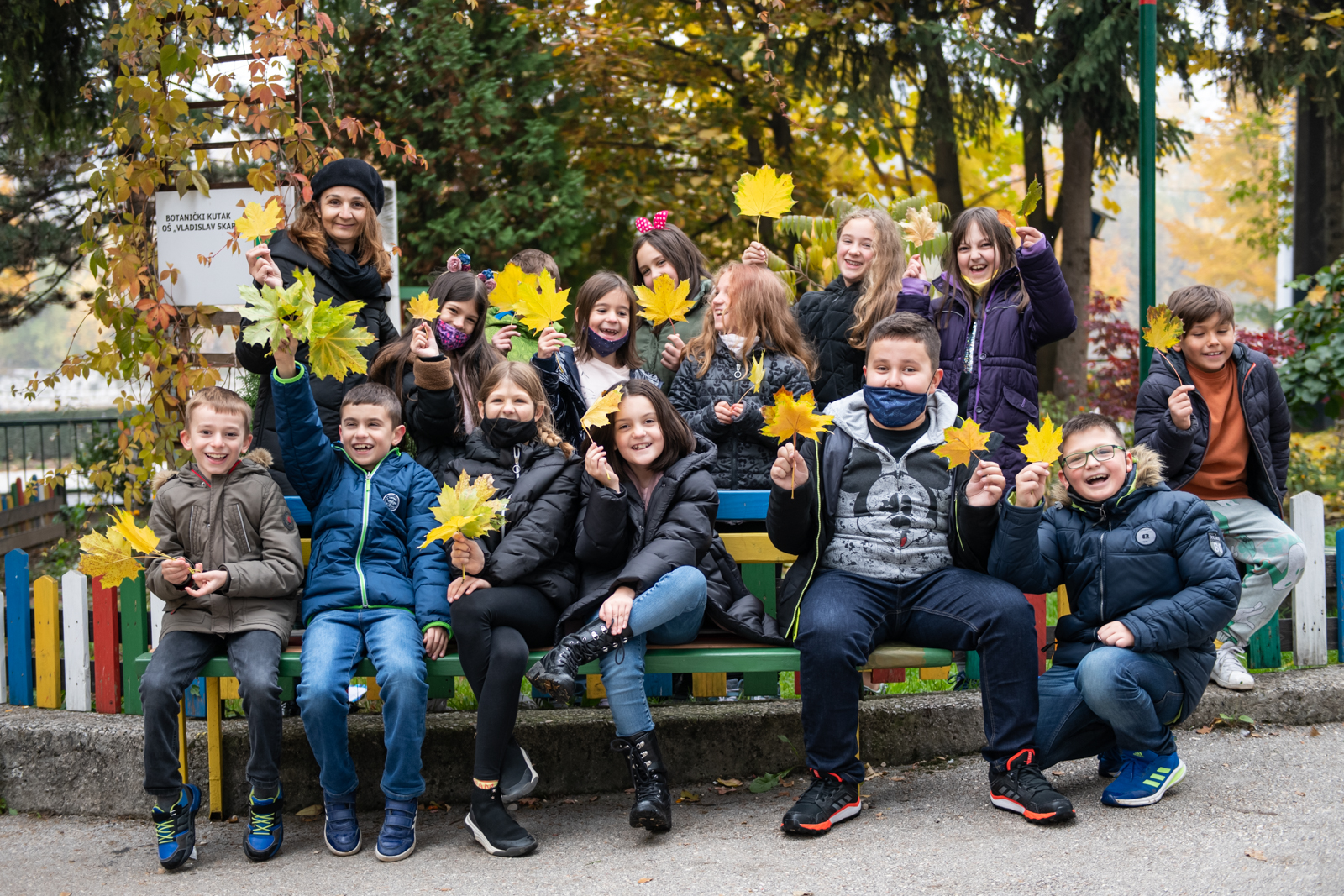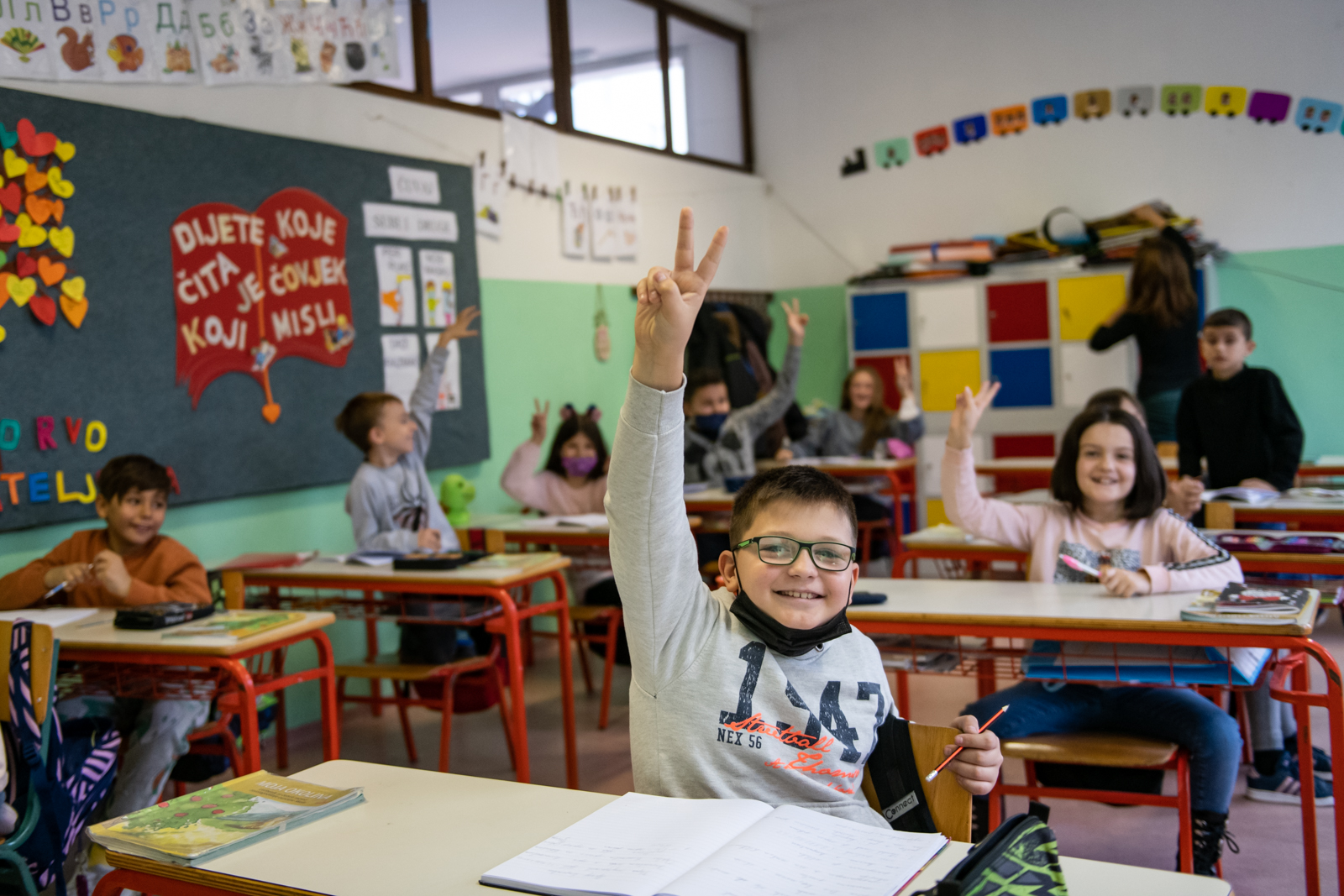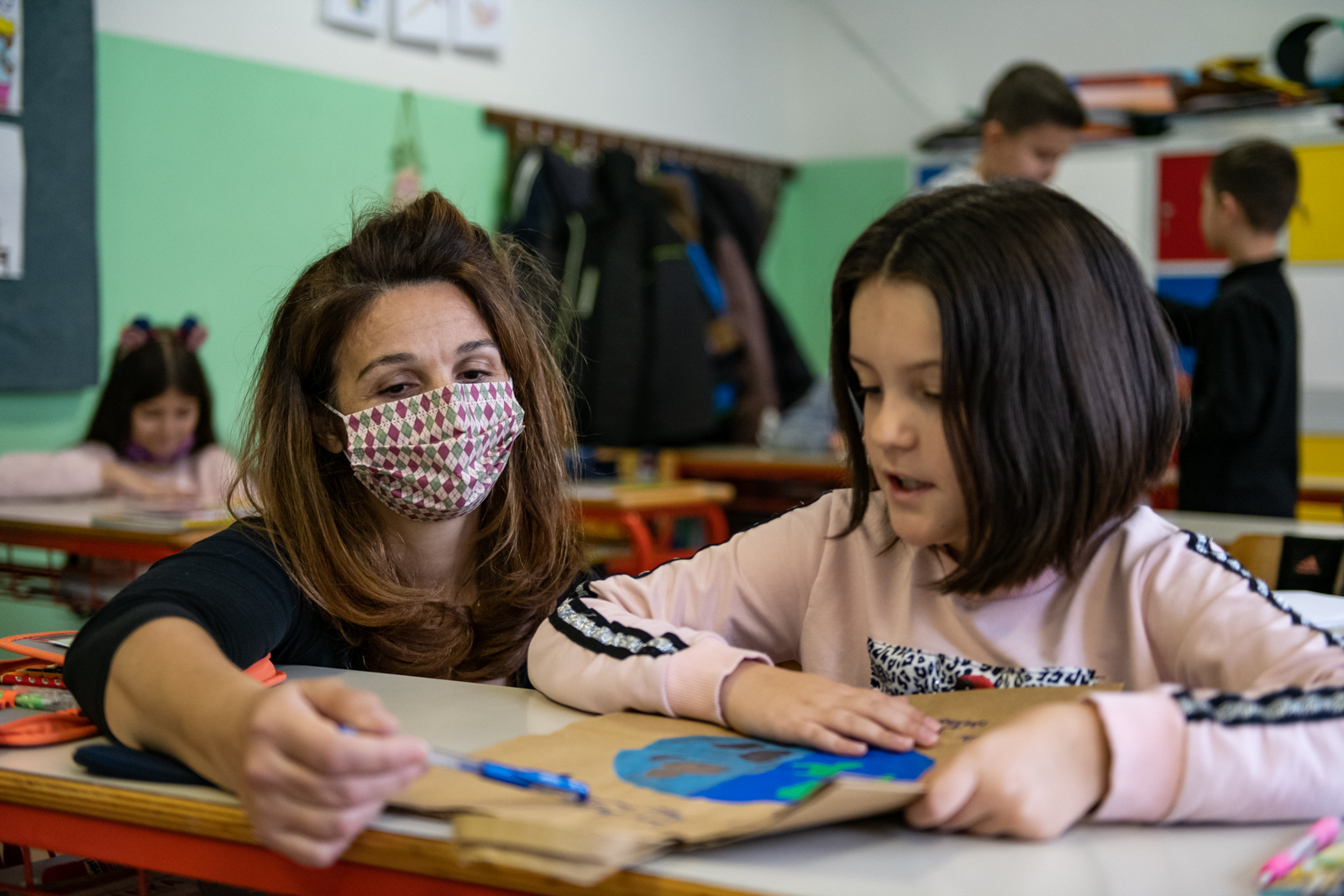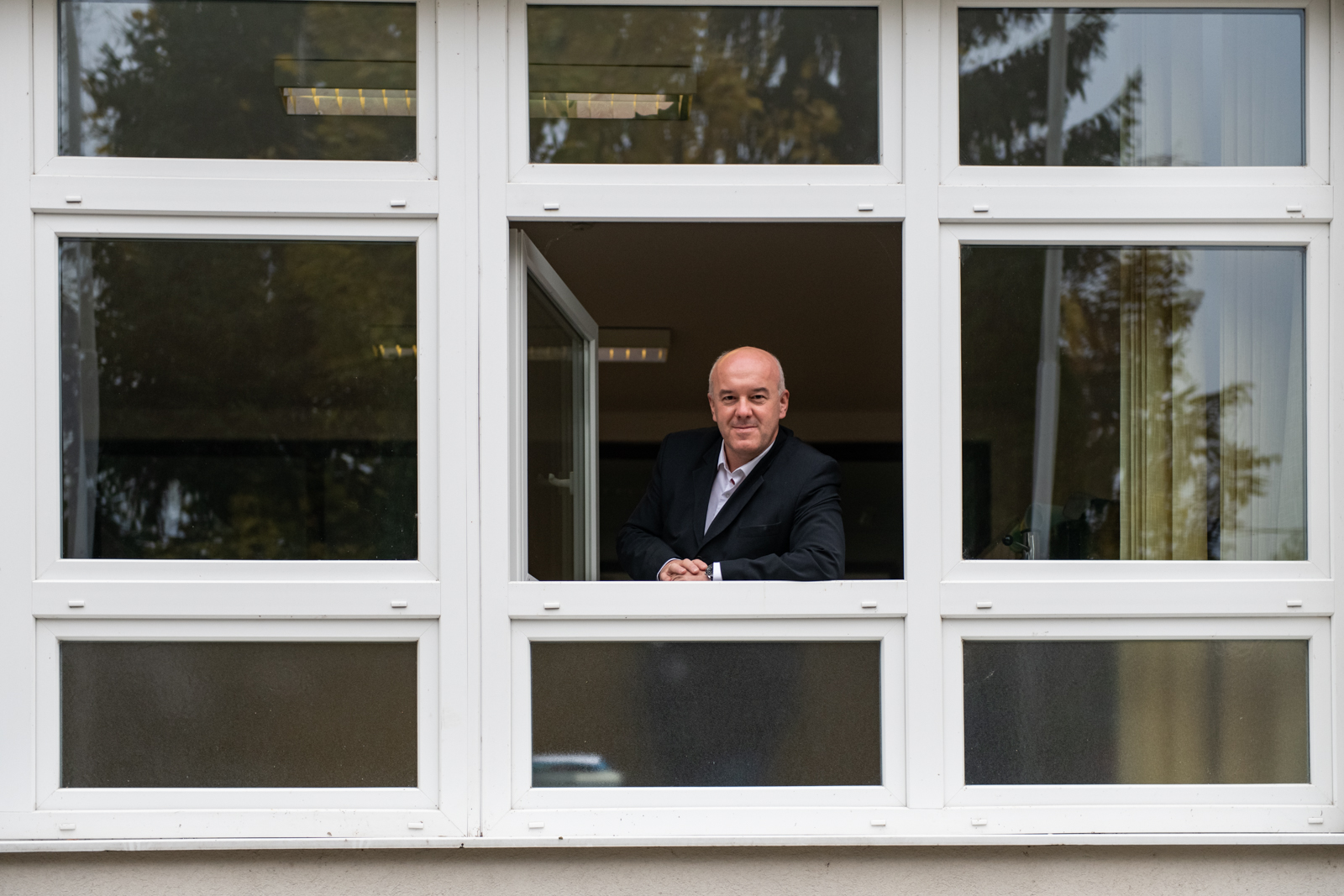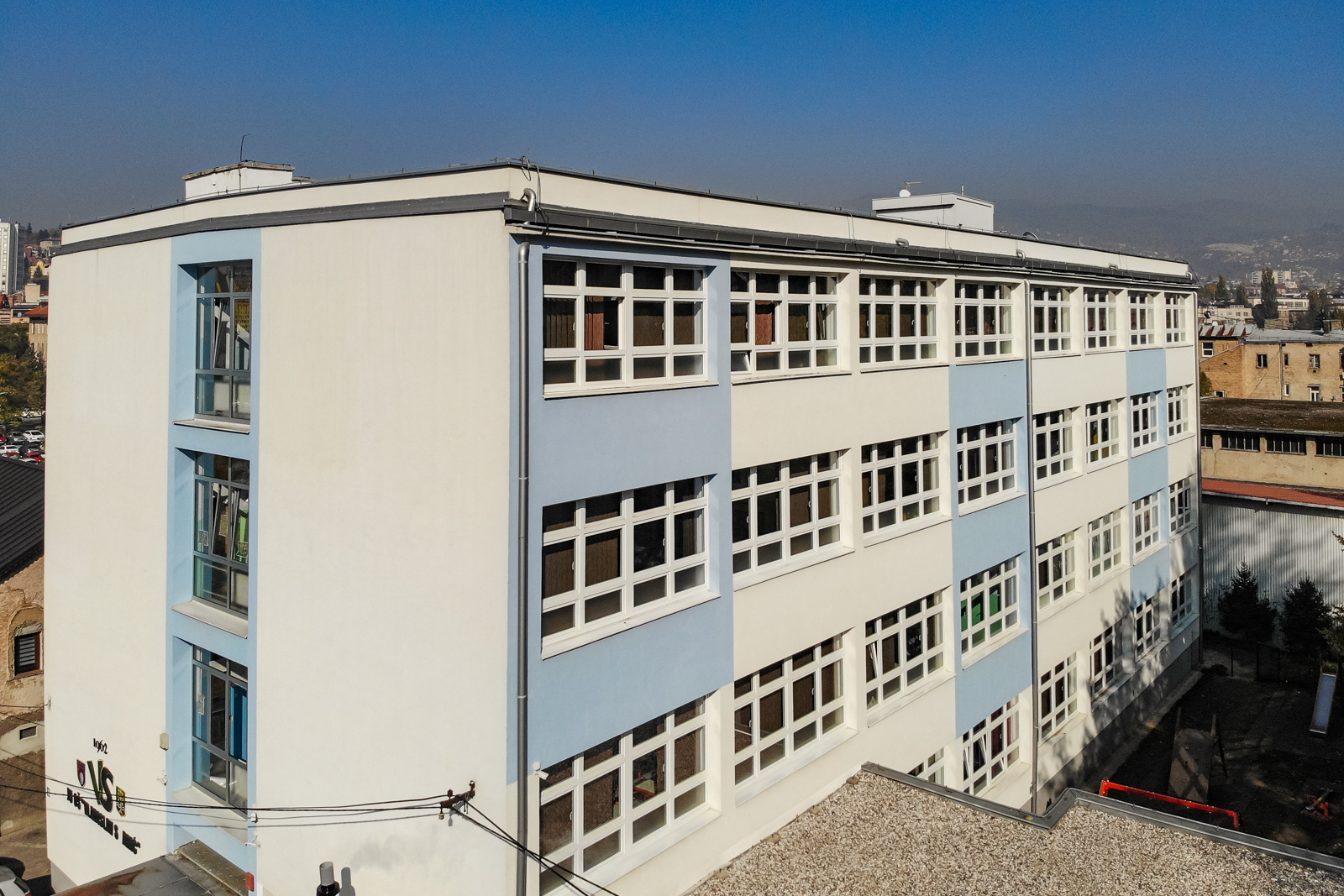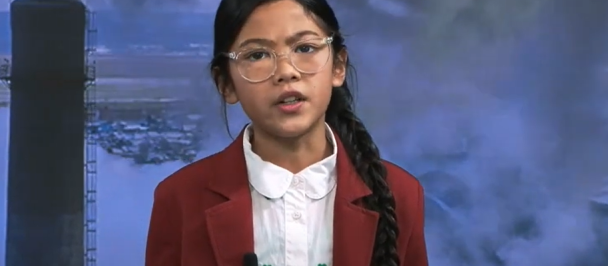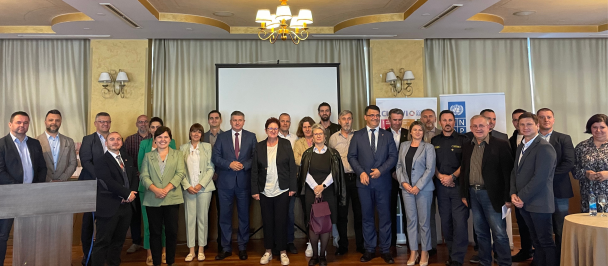Učenici škole sa učiteljicom Nedžmijom Omeragić
Energy must not be wasted or consumed unnecessarily – the fourth grade students of Sarajevo’s „Vladislav Skarić“ Elementary School have said. In a bright classroom, surrounded by the walls decorated with their drawings and pinboards, they are holding up two fingers, eager to respond to their teacher’s question about the importance of saving energy and protecting the environment.
“The Sun is the source of energy, just like water,” and “We are saving water and using less heat and electricity” – these are just some of the responses by students whose school underwent an energy retrofit over the past months, its façade was renovated and its interior painted in pastel shades, and it is now more energy efficient.
What they discuss with their teacher about climate change and ecology, energy saving and reduced pollution is now being felt in their classroom to which they come every day, since the beginning of this school year, after schools reopened and went back to normal, following COVID-19 safety measures.
Nice and warm school
After the school year 2020/2021, in which the model of teaching changed a number of times and was a combination of shortened in-class and online learning, this autumn students and teachers have returned to their regular and most desirable in-person activities in the classroom, with the infrastructure upgrade works inside the building completed around the same time.
“We turned a school which was gray, even ugly, into a brightly colored school building, which is now something nice to look at”, says the school principal, Meho Pirić, also emphasizing the successful installation of gas boilers for school heating which replaced the heating oil-fired system, which was the only heating system after the school’s post-war reconstruction in 1997.
“Pollution has been reduced to minimum and utilization is maximum. Literally, the boiler takes heat from the smoke which we would otherwise expect to come out of it, and only then is cold smoke released into the atmosphere”, the school principal explains. “Time will show that economic calculation. I think we will achieve significant savings since gas is more affordable”.
Installation of heating boilers and connecting the school to the gas pipeline network supplying gas to the city, and energy efficiency measures like replacing windows and doors, installing external façade thermal insulation and the roof with thermally insulating layers, are all important infrastructure projects which were partly funded by Sweden through the “Green Economic Development” project, implemented by the United Nations Development Programme (UNDP), in cooperation with local authorities. Of the total investment of around BAM 535,000, Sweden contributed around BAM 165,000 and the Sarajevo Canton Ministry of Utilities, Infrastructure, Physical Planning, Construction and the Protection of the Environment and the Sarajevo Centre Municipality contributed around BAM 370,000.
“As a result, although temperatures are already around 0 degrees, the school is warm and bright, and I think it is a blessing that our students have long deserved”, says Mr. Pirić, the principal and pedagogue who has worked in this school for the past 20 years.
“No matter how much the school was heated, heat escaped quickly, leaving it cold,” he says of the old windows that did not keep the heat inside the school. “It was a huge loss of energy for us. Thermal insulation and new sheets were installed on the roof. So, the work is done now, and there is no energy loss any longer, and our school is now warmer but also safer because we had wood-framed windows that swayed”.
In parallel with external works, the school interior was re-painted in bright, pastel colors, the classrooms were improved, and Mr. Pirić is now pleased with the conditions under which 235 students attend school in 12 classes and emphasizes that an impact of better conditions is a mild increase in the number of students attending the school.
Awareness about the environmental protection
Snug behind a dozen trees and a small botanical garden, the “Vladislav Skarić” Elementary School is located at the center of Sarajevo, next to one of the main city roads, at Terazija Street, near Skenderija. Surrounded by new and modern buildings, there is a playground behind the school where children and teachers spend time during regular school hours and also in after-school activities.
“It is a blessing that children are back in school, that they spend school days with their peers and teachers, precisely as they should, and not at home sitting in front of a laptop or tablet,” Mr. Pirić emphasizes, adding that it is even more comfortable now as teaching and learning take place in a retrofitted school, which means significant financial savings for the school administration resulting from the energy efficiency retrofit measures.
He adds that ensuring the state-of-the-art conditions for children in schools is good for the local community and also that taking guidance from the principles of environmentally friendly practices is important for protection of the environment.
Adaptation to increasingly pronounced climate change is an important obligation on the part of both the states and local authorities. With the global increase in urbanization and concentration of population in cities, the role of the cities, smart and good planning and maintenance of infrastructure are also getting more pronounced.
The theme of World Cities Day 2021 is devoted to the challenge of urbanization and contribution to sustainable urban development across the world. Making cities resilient to climate change is at the heart of Sustainable Development Goals and many cities of the world are already seriously threatened by floods, droughts, landslides and storms. It is estimated that around a billion people who live in urban settlements are particularly vulnerable due to uninhabitable accommodation and lack of access to the basic resources, such as clean water, wastewater disposal and reliable energy supply systems.
Adaptation to harmful climate change effects and the global mobilization in order to stop negative trends are at the focus on this year’s COP26 UN Climate Change Conference, which is taking place in Glasgow.
Awareness about the environment
The contribution of the local authorities to the environmental protection and building resilience to climate change is important, but individual contributions and changing environmental awareness are equally important.
Referring to the environmental club that she runs, teacher Nedžmija Omeragić recalls some of the students’ actions, like making a bench out of old bottle caps, which they dubbed a “bottlecap bench”, or making a Tetra Pack birdhouse and a flower vase out of a plastic bottle.
“Children should be aware of energy preservation and saving, protection of the environment and recycling”, she says. “Oftentimes we organize actions on important days, we plant flowers, and we have bought an apiary. We have produced eco messages, we planted trees in the park, we have learned how to properly dispose of batteries. We are a true eco school. My hard-working students have done it all”.
Check photo galery
The GED project is funded by Sweden and implemented by the United Nations Development Programme (UNDP) in partnership with the Ministry of Foreign Trade and Economic Relations of Bosnia and Herzegovina, the Environmental Fund of the FBiH and the Environmental Protection and Energy Efficiency Fund of Republika Srpska, the entity ministries of spatial planning and energy, cantonal ministries, municipalities and other partners. The GED project aims to facilitate favourable conditions for investments in energy efficiency projects, increase the number of green jobs, as well as to contribute to environmental protection and economic development of Bosnia and Herzegovina.

 Locations
Locations